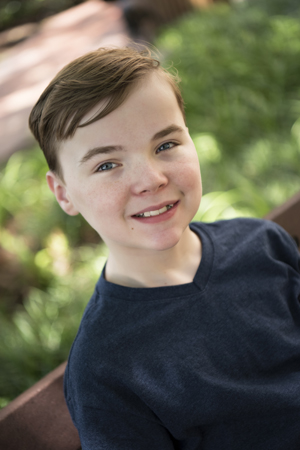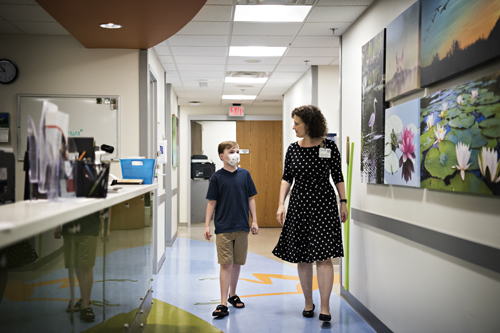Progress in cystic fibrosis care

Look, the doors actually open and close,” says Hunter Blankenship as he shows off his latest Lego construction, a realistic replica of the famous station wagon from the “Ghostbusters” movie series. The car was a gift for his 13th birthday this past spring. Like many kids his age, Hunter loves building things, and his collection of intricate creations is so large it has taken over an entire room in his family’s Windsor home. Now officially a teen, Hunter and his family are celebrating the milestone with extra enthusiasm and gratitude. “We feel very fortunate,” says Hunter’s mom, Amy, a local preschool teacher. “Without the team at CHKD, Hunter might not be here.”
In 2007, 3-year-old Hunter was suffering from chronic respiratory problems. His mother took him to see
Dr. Laura Leverone at
Suffolk Pediatrics, a CHKD Medical Group practice. Dr. Leverone referred Hunter to
CHKD’s pulmonology clinic for evaluation and testing. His parents were stunned when their only child was diagnosed with
cystic fibrosis, as neither of them knew of any family history of the disease.
“At first, we were overwhelmed. I remember wondering how we were going to be able to care for Hunter,” says Amy. “But the team at CHKD was so informative and supportive. They have been by our side from day one.”
Cystic fibrosis is caused by mutations in the gene that produces a protein that regulates the flow of salt and fluids in and out of cells in the body. The malfunction of this protein causes the body to produce thick, sticky mucus that can block airways, cause severe lung infections and even lead to respiratory failure. The mucus also prevents digestive enzymes produced by the pancreas from reaching the small intestine where they are needed to break down food and absorb nutrients. People with cystic fibrosis often experience shortness of breath, persistent coughing, and they may have trouble growing and gaining weight. Although there have been great advancements in the treatment of cystic fibrosis, it is a chronic, life-threatening disease that does not yet have a cure.
Dr. Cynthia Epstein, a pediatric pulmonologist and the director of the Cystic Fibrosis Center at CHKD, has been part of Hunter’s care team since his diagnosis. “One of the greatest things about our program at CHKD is that children and young adults have a multidisciplinary team of
pediatric specialists working together at every visit to provide all of the medical care, support and education they need,” says Dr. Epstein. “Kids like Hunter see pulmonologists, infectious disease specialists, nutritionists, respiratory therapists, social workers and nurses.”
As an accredited member of the Cystic Fibrosis Foundation’s care center network, the Cystic Fibrosis Center at CHKD helps shape best practices in caring for patients with cystic fibrosis and participates in the latest clinical research. Since the discovery of the cystic fibrosis gene in 1989, continued genetic research has led to some of the most significant improvements in care.
Today, there are more than 1,700 known mutations of the gene. Care centers like CHKD share data including the exact genetic mutations of individual patients. This collaboration has led to the development of medications that improve symptoms and some that even correct defects caused by specific genetic mutations.
Last year, about 140 children and young adults received care at the
CHKD Cystic Fibrosis Center. These patients must make frequent visits to stay healthy. Hunter has made over 100 visits to CHKD since he was diagnosed. “I remember walking down the hallway with Hunter in his stroller in the early days,” says Amy. “The staff here has cared for him almost his entire life.” During his first admission, Shannon Hood, a child life specialist, gave Hunter a toy medical kit, which he still has today.
“Hunter is a kid with a lot of energy who doesn’t let a hospitalization bring him down,” says Shannon, who has watched Hunter grow up during the past decade. “We get to know our patients over the years and try to create fun environments for them while they are with us.”
“I like all of the movies and video games, and sometimes I even get to leave with a new set of Legos,” says Hunter of his time in the hospital.

Cystic fibrosis requires lifelong care management and ongoing health education. At CHKD, the
cystic fibrosis team helps patients understand their illness at an age-appropriate level and teaches patients how to take care of themselves with a goal of reducing hospital visits.
“Today, the predicted median survival age for a person with cystic fibrosis is almost 40, compared to the 1950s when children with the disease barely reached elementary school age,” says Dr. Epstein. “Even in just the last five years, we have seen great advances in treatment. New medications have been shown to reverse mucus buildup, aid in weight gain, greatly improve lung function and prevent further damage. There are even two drugs that target the underlying cause of cystic fibrosis—the defective CFTR protein—in some patients. And there are many more in the pipeline. There is optimism in the field that I think is important to communicate to families.”
Hunter’s current treatment plan includes many medications, some of which are available because of the ongoing clinical research that CHKD participates in. In addition, Hunter wears a specialized therapy vest three times a day that oscillates his chest wall to help move mucus out of his lungs.
Today, Hunter is feeling good and looking forward to his summer vacation. “It has definitely been quite a journey,” adds Hunter’s dad, Brandon. “The support of the CHKD team and other patient families has helped us tremendously.”
Hunter doesn’t focus on his cystic fibrosis. He’s more interested in building robots, working in the mechanic shop with his grandad and starting the eighth grade this fall. When asked how he feels about living with cystic fibrosis, he responds without hesitating. “I only wish for one thing,” he says. “A cure.”
This story was featured in the summer 2017 edition of
Kidstuff magazine, a quarterly publication from CHKD that features inspiring stories about patients, physicians and friends of CHKD.